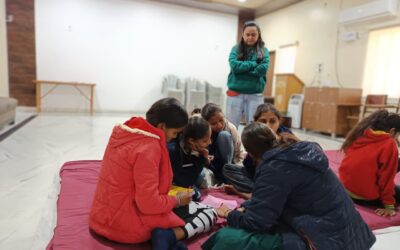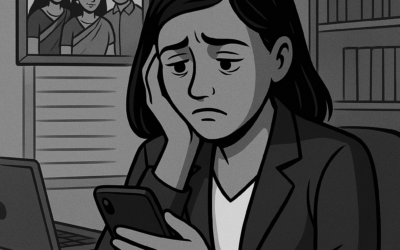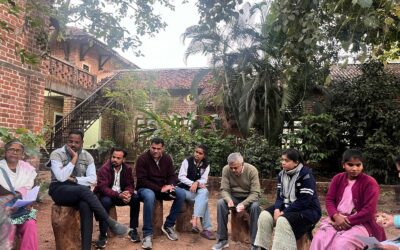As an India Fellow, I got the chance to go to some villages around Udaipur with my co-fellows as part of our induction training program. The first time, we went out to try our hand at mapping out a village. The next time, we attempted to create a seasonal calendar to understand the lives of others, better. I was also able to meet some farmers in Udaipur. Here are some stories from it and how it took me on my own thought roller coaster rides.
Lend me an Ear?
That week, communal tensions in the city foiled our plan to visit the villages in Udaipur. So we decided to walk to places closest to our residence to find some people to talk to and build a seasonal map. We met this rather coy farmer Lakshmi at Syphon chowk a few hundred meters away from where we were staying. She was waiting for a bus to take her back to her in-laws’ house. She had spent Raksha Bandhan at her mother’s house here.
Lakshmi tells me that when she has no one to talk to at home, she talks to her pet parrot. She has four grown-up sons, and expressed her wish to have daughters. Lakshmi is keen on bringing home a daughter-in-law and treating her like a princess.
This took me on my own tangential thinking. As a take off and assuming Lakshmi perhaps experiences loneliness, I fear that a lot of women in India feel unheard and lonely like Lakshmi. Metropolitan women also suffer this plight. I hope women can find each other and create safe spaces for one another, not just to be able to talk and share their experiences and spend leisure time together. But also against larger issues such as violence against women.
Men, too, need to take ownership of this cause, if they claim to be well-intentioned. Because it is men who continue to hold positions of power, especially in rural spaces, and therefore, must actively make space for ideas that women have to share.
I hope women can recognise all the ways in which patriarchy and capitalism together, works against us. How we are pitted against each other – so we can come together and care for one another in spite of it.
An Act of Giving
On another occasion, we were fortunate enough to actually visit the villages we were assigned to. So, in Madaar, we came across Ramlal ji carrying fodder on his head. He is a 72 year old, kind looking farmer. He took it upon himself to be our tour guide and show us around Madaar. His stories are impressive. He was the class monitor in school and excelled in sports. He wished to join local politics but declared that he didn’t because he was an honest man and that politics has no place for it. A very politically aware man, he teases a tourist from Delhi passing by Chhoti Madaar lake asking him why was Kejriwal in jail.

He invited us home for a refreshing bowl of raabdi (cornmeal cooked in buttermilk) and makke ki roti. I still regret acting modest and refusing to eat more than half a roti. I needlessly worried that his generosity towards the five of us might leave his own family without enough to eat. There is something in me, that makes me worried. I am afraid we might lose such hospitality and humility with Ramlal ji’s generation. What are the roots of this fear, i should investigate.
A Jarring Remark
Now Ramlal ji had a relative – a distant cousin – who said something disconcerting. When we took pictures with them, he taunted us, “you will go back to the city and show them how the animals live”. It took me a few seconds to register that. Until he had said that I couldn’t have guessed that he held any resentment towards our ‘true’ intentions. How could they have thought of us as malicious (ridiculing them later) when they offered to feed us themselves?
To invite home, feed and entertain, an apparently disparaging group of people must require a great deal of tolerance and courage. But also, perhaps, an attempt to challenge our perception of them with that remark. Despite the fact that I couldn’t have held those two men in higher regard after how they treated us.
But it was a great lesson in open mindedness – that we don’t have to stop looking after each other, despite our differences. Imagined differences or otherwise.
I hope we all can learn from it so that we can have important political discussions and debate with and educate one another, without the cost of our collective joy. At the same time, I felt sorry that someone had made them feel like animals; but I was not shocked. A lot of privileged city-folk do engage with rural people through a lens of superiority, instead of trying to undo the years of dehumanisation that those like them have subjected rural folk to.
Similarly, I fear for the lives of the marginalised such as Muslims and caste minorities who have long faced such dehumanisation, coupled with grave systemic injustices and the threat only grows more severe by the day. As Indians, today, I hope we make an effort to not let larger forces bitter our interpersonal relationships. To not let institutions weaponise our identities for the benefit of politicians and the economic minority. To look beyond what we merely see in another human.
Hope for Accessible and Quality Healthcare
I think of another woman we met at the bus stop at Syphon chowk. She had lost her child to an unknown disease that they weren’t able to cure despite taking him to the hospital. And another woman whose 15 year old daughter had chamki bukhaar (encephalitis) that had left her bedridden for a month. This ailed her at the same time last year as well causing her to miss her final exams at school. She seeks help from a baba. I hope our healthcare services penetrate to the most needy regardless of their caste, gender, religious and economic backgrounds and that universal healthcare actually turns into a reality.
Also Read: From Udaipur, With Love




0 Comments